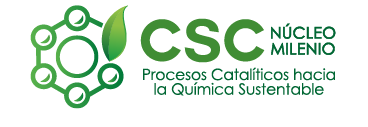julio, 2020

Detalles del evento
Webinar: New Trends in Catalysis for biomass valorization About this webinar The millennium nucleus of catalytic processes towards sustainable chemistry (CSC), is an interdisciplinary research project that addresses the problem of replacing
Más
Detalles del evento
Webinar: New Trends in Catalysis for biomass valorization
About this webinar
The millennium nucleus of catalytic processes towards sustainable chemistry (CSC), is an interdisciplinary research project that addresses the problem of replacing petroleum products using biomass, as an abundant natural resource in Chile and that has the advantage of being CO2 neutral . The CSC addresses this problem from the foundations of chemistry and engineering, developing and evaluating new materials and processes to transform biomass into high-value products using chemical processes with low environmental impact, classified within green chemistry or sustainable chemistry.
Academics and researchers from the areas of physicochemistry, computational chemistry, chemical engineering, inorganic chemistry and natural product chemistry from 4 Chilean universities work on this project. CSC researchers work in collaboration with multiple prestigious international institutions. Among these institutions are the Research Institute on Catalysis and Environment of Lyon, France and the Åbo Akademi University, Finland through Dr Dorothée Laurenti and Prof Dmitry Murzin respectively. These academics have an outstanding track record and international prestige in the area of sustainable chemistry and valorization of lignocellulosic biomass.
REGISTER FOR FREE HERE
Lignocellulosic biomass catalytic conversion to chemicals for a safer and greener future
Presented by Dr Dorothée Laurenti
Biomass will play an important role in the future of humanity, as it is a very abundant resource to provide chemicals usually obtained from fossil industry. These last years, we have seen a dramatic increase of publications reporting the conversion of biomass to chemicals, fuels and materials. Like the traditional refinery, majority of those transformations are based on a catalytic process and the development of catalysts which meet the requirements to convert real feed of biomass is becoming a hot topic. Depending of the nature of the biomass, the catalyst must be resistant to the various components and sometimes needs to work in hard operating conditions. In this presentation, we propose an overview of the most efficient catalysts employed for the valorization of lignocellulosic biomass.
Dr Dorothée Laurenti completed her PhD in Marseille (1999) and held postdoctoral positions in York and Lyon University. She works as a CNRS researcher at IRCELYON (France) in the field of heterogeneous catalysis. She is developing catalysts for hydrotreating reactions and for biomass conversion (lignin, lignocellulosic, micro-algae), thanks to the use of characterization techniques such as GCXGC, GPC or NMR for identification of complex feeds. She authored 56 articles, 3 patents and 60 conferences (H factor 26).
Base catalysts for biomass valorization
Presented by Prof Dmitry Murzin.
While heterogeneous acid catalysts is widespread, base-catalyzed reactions have been studied to a much lesser extent. An exploding interest in the last decade to heterogeneous catalysis by bases is strongly related to development of (lignocellulose) biorefinery concepts.
One of the key-reactions for valorization of lignocellulosic biomass is interconversion of aldose to ketose. In the lecture, recent work on isomerization of glucose, galactose and arabinose to corresponding keto-sugars over a range of heterogeneous catalysts will be discussed.
Another potential way of transforming biomass is related to multistep conversion of cellulose to pentanol and hexanol. Further upgrading of these alcohols can be done by the Guerbet reaction, leading to 2-alkyl alcohols having a unique branching pattern. Recent efforts on the Guerbet reaction of C5-C6 alcohols using heterogeneous catalysts will be discussed.
The final example will be related to preparation of higher molecular weight compounds from short bio-derived carboxylic acids through decarboxylative coupling of acids with formation of ketones.
Prof Dmitry Murzin studied chemical engineering and chemistry at Mendeleev University in Moscow (degree with honors in 1986). Got his PhD in 1989 with Prof. M. I. Temkin at Karpov Institute of Physical Chemistry and in 1999 was awarded DrSc degree. After research visits to University of Strasbourg and Åbo Akademi University in 1995 he joined BASF, returning in 2000 to Åbo Akademi as a Chair of Chemical Technology. The main interests are in heterogeneous catalysis, catalytic kinetics and chemical technology. He has authored 6 books, 800 articles in peer reviewed journals, 4 patents, 24 plenary and 29 key-note and invited lectures (H index 58 WoS, 60 Scopus)
Hora
(Miércoles) 10:00 - 11:30 Chile
Ubicación
Zoom room will be informed to registered participants
